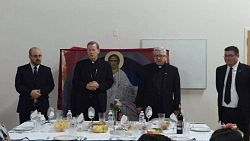The Neocatechumenal Way is working in four Utah parishes
Friday, May. 01, 2015

Intermountain Catholic
+ Enlarge
Standing with Archbishop Wester are members of the Neocatechumenal Way team (from left) Pablo Gomis, Father George Szal, SM, and Johnnie Villalba.IC photo/Laura Vallejo
SALT LAKE CITY —Five years ago a group of itinerant missionaries were on their way to Arizona, but a stop in St. George opened an unexpected door to a new ministry in Utah’s Catholic Church.
The Neocatechumenal Way, also known as the Neocatechumenate, is an organization within the Catholic Church dedicated to the Christian formation of adults.
Formed in Madrid in 1964 by Kiko Argüello and Carmen Hernández, the Way received approval from the Holy See in 2008.
“When the missionaries stopped in St. George they visited Father Gustavo Vidal (then pastor of St. George Catholic Church) and he was open to receiving us at his parish,” said Pablo Gomis, a seminarian from the Archdiocese of Boston who is responsible for the Neocatechumenal group that covers Utah and Nevada.
Gomis explained that the Neocatechumenal Way is not a movement or an association, but rather an instrument in the parishes at the service of the bishop, to return to faith many of those who abandoned it or who are looking for more formation in the faith.
“”We work with all the baptized; the formation is very similar to the one offered to the non-baptized,” said Gomis. “It is a way of conversion through which the richness of the Gospel can be rediscovered.”
After forming a group in St. George, the door of St. Francis of Xavier Parish in Kearns opened.
“We formed another small community there and we are now working with Sacred Heart and Our Lady of Guadalupe” parishes, said Gomis.
The nature of the Neocatechumenal Way was defined by Saint John Paul II when he wrote: “I recognize the Neocatechumenal Way as an itinerary of Catholic formation, valid for our society and for our times.”
Recently, as an answer to the need for a New Evangelization, many families that have lived this experience have offered to help the mission of the Church by going to the most secularized places in the world, preparing for the birth of new missionary parishes.
As recent as March 6, Pope Francis received in audience members of the Catholic missionary movement. Sending 31 new missionary agents composed by 200 families and 600 children Pope Francis addressed the group.
“… [O]ur meeting today is a missionary commissioning, in obedience to what Christ asked us: “Go into the whole world and proclaim the Gospel to every creature,” Pope Francis said. “And I am particularly glad that this mission is carried out thanks to Christian families, united in a community, who have the mission to give witness to our faith that attracts people to the beauty of the Gospel, in the words of Christ: ‘This is how all will know that you are my disciples’ (cf. Jn 13:34), and ‘be one and the world may believe’ (cf. Jn 17:21).
He added, “These communities, called by the bishops, are formed by a priest and four or five families, with children, including grown-up ones, and are a ‘missio ad gentes’, with a mandate to evangelize non-Christians. Non-Christians who’ve never heard about Jesus Christ and the many non-Christians who’ve forgotten who Jesus Christ was, who is Jesus Christ; baptized non-Christians but who have forgotten their faith because of secularization, worldliness and many other things.”
The Neocatechumenal Way itinerant team that works in Utah and Nevada is formed by Gomis; Johnnie Villalba, a seminarian from the Archdiocese of New Jersey; Ed and Rachel Condon; and Father George Szal, SM, from the Archdiocese of Boston.
They will continue going all over the Diocese of Utah, knocking on the doors of the parishes, offering their mission which is at no cost. The missionaries do not ask for anything; sometimes they sleep in their cars or in open spaces while they give their classes.
“We offer everything for God and we trust that He will provide,” said Gomis.
For questions, comments or to report inaccuracies on the website, please CLICK HERE.
© Copyright 2025 The Diocese of Salt Lake City. All rights reserved.
© Copyright 2025 The Diocese of Salt Lake City. All rights reserved.

Stay Connected With Us